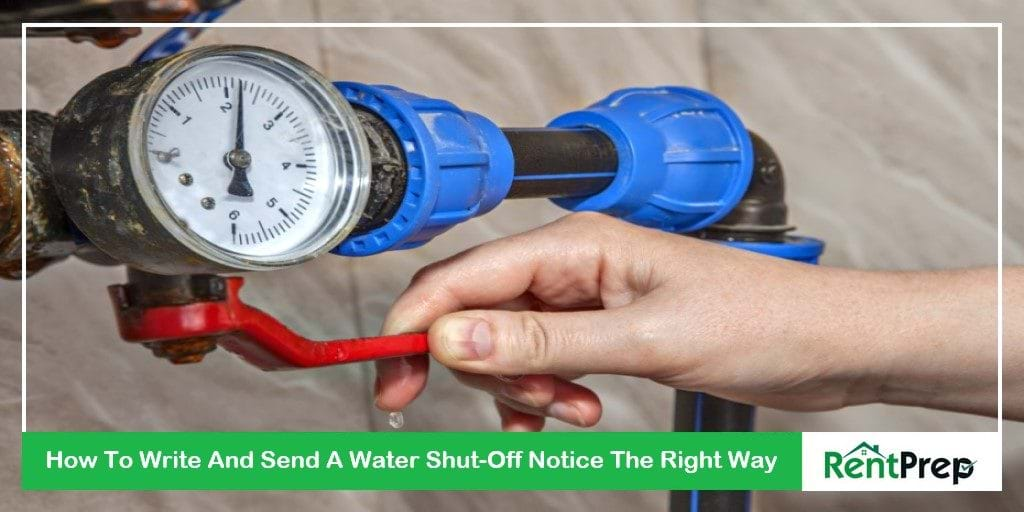
The basis of every law about landlord responsibilities point to this fact: You are responsible for maintaining your properties in livable condition. There are certain necessities of life that you cannot block or prevent your tenants from having at your property, like water and electricity.
 When you do need to turn off a service for scheduled maintenance or to repair something in an emergency, your tenants may be left without these necessities. And that could leave you in trouble with the tenant, with the court system, and even with the law!
When you do need to turn off a service for scheduled maintenance or to repair something in an emergency, your tenants may be left without these necessities. And that could leave you in trouble with the tenant, with the court system, and even with the law!
What do you do when you need to turn off the water? What you need is a water shut-off notice. Using this notice, you can legally turn off the water for a set period of time because the tenant is made aware of the shut-off beforehand.
Finding the right way to write a no water notice can be a little bit confusing, so we have put together a water shut-off notice to tenant template for landlords like to use. This free template can simplify your life, but it’s still important to understand why you need it.
And today’s guide to water shut-off notices will teach you just that!
A Table Of Contents For The Water Shut-Off Notice Sample
- What Is A Water Shut-Off Notice?
- When Is A No Water Supply Notice Needed?
- Our Water Interruption Notice Sample
- It’s Up To You To Deliver The News
What Is A Water Shut-Off Notice?
A shut-off notice is a legal notification document that lets tenants know they may have no water supply for a specific period of time. The notice also lets them know why this shut-off is happening and how they can voice any concerns to you before it happens.
The document is usually delivered between one day and one week before the shut-off occurs. The rule of thumb is that you should always deliver a notice at least seven days in advance, but this rule can be bent if the repair is more urgent. Emergency repairs can also happen more quickly as long as you make a reasonable attempt to alert the tenant about what’s happening.
When Is A No Water Supply Notice Needed?
As a landlord, you are required to know when to send out these type of notices. But if you haven’t had to deal with a no water situation before, then you may not know when to use it!
Water cut-off notices must be used at any time when the water will be intentionally shut-off at one of your properties. Because water is a required necessity your tenant has a legal right to use, you must give them notice when it won’t be available.
Tenants That Won’t Leave

Remember that you can never use a water shut-off as a way to force your tenant to leave the property. Even when tenants do not pay rent, you are not legally entitled to shutting off their utilities. Only the utility companies can make this choice if the tenant themselves are not paying the bill.
If you’re dealing with a tenant that just won’t leave, you’ll need to turn to eviction methods rather than trying to force them out with utility shutoffs. Avoiding these situations in the future can be accomplished by improving your tenant screening techniques. Good tenants are worth the extra work!
Our Water Interruption Notice Sample
Now that you know more about why and when a water supply cut-off notice is necessary, take a look at the water shut-off notice template that we have:
| Water Shut-Off Notice Template |
To use this template most effectively, you should try to get a good understanding of what aspects must be included to make this notice as clear and communicative as possible.
Basic Identifying Information
As usual, every form that you produce as a landlord should start with the basic identifying information that will clarify who this document is for and when it was delivered.
For forms like these, include the following:
- Date
- Property address
- Tenant names
This information is important for not only you and the tenant, but also for your recordkeeping purposes. If the tenant should try to file suit because of the water being turned off, this document will help you to prove that you did give them the required notice.
Notice Dates & Times
The next section of the notice should detail the specific time period during which the water will be shut-off. The shut-off should only cover one day, if possible, to cause as little interference with your tenant’s day-to-day life as possible.
If you need to turn the water off for more than one day, you may want to check your local laws about this type of disturbance. In some areas, you may be required to cover a night’s hotel stay if the tenant requests alternative living arrangements while the water is off.
For a shorter shut-off, however, no such arrangements would be necessary.
Keep this section short and to-the-point. The main things that you need to convey are:
- What day the water will be off
- What times the water will be off
- What water services will be affected
As long as you impart all of this information to your tenants, your no water supply notice will do exactly what it is meant to do.
Closing & Signature
Finally, you’ll want to wrap up the document with a closing apologizing for the inconvenience as well as your signature.
If you want, you can add another small section here that reminds the tenants of your contact information in case they have any problems with the scheduled date and time of the outage. While you might not be able to change it, giving the tenant the chance to discuss with you directly is always a nice option to build strong communication channels.
It’s Up To You To Deliver The News
Imagine this. You turn off the water to your tenant’s home without notice to do some repairs. The tenant has no idea what is wrong, and they panic thinking that they forgot to pay their bill or some other major issue has occurred. In the end, you’re able to let them know that they didn’t do anything wrong, and the water is off for scheduled repairs. Wouldn’t it be best to just avoid that situation altogether?It is your job to ensure that your properties are in habitable condition for your tenant, and that also means that tenants have the right to know when they won’t have water.
By using a no water notice before you do any repairs that are related to the plumbing or water service, you’ll ensure that this situation can never happen. And that will make you a much better landlord than someone who completely disregards this notice!
Do your duty as a landlord and ensure that you are always giving your tenant notice about issues like this that might affect them. Even if not legally required in some cases, it’s always better to keep the communication between you and the tenant as clear as possible.

